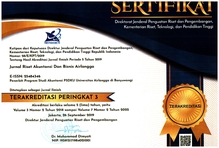ADOPTION OF ISLAMIC BANKING IN FINANCIAL SATISFACTION : STUDY ON BANK SYARIAH INDONESIA YOGYAKARTA REGION
Downloads
The main purpose of this study was to examine the effect of Islamic financial literacy, religiosity, bank
reputation, and risk attitude on the adoption of Islamic banking. Examine the mediating role of the adoption of
Islamic banking on the influence of Islamic financial literacy, religiosity, bank reputation, and risk attitude on
financial satisfaction. The statistical analysis model used mediation regression. The research population was
1.033.264 and the sample was 336 Bank Syariah Indonesia customers in the Jogjakarta region. The sampling
technique used was random sampling, a data collection method using a questionnaire. The mediation
regression analysis tool uses SEM-PLS. The results show that: Islamic financial literacy has a positive effect
on the adoption of Islamic banking products. Bank reputation has a positive effect on the adoption of Islamic
banking. Religiosity has a positive effect adoption of Islamic banking. The risk attitude affects the adoption of
Islamic banking. Adoption of Islamic banking mediates the effect of Islamic financial literacy, bank
reputation, religiosity, and risk attitude on financial satisfaction. The results of the study add to the literature
and the results of empirical studies of Islamic financial management. Provide recommendations for Islamic
Bank policies, namely: policies to increase Islamic financial literacy, bank reputation, risk attitude, adoption of
Islamic banking, and financial satisfaction to improve the welfare and performance of the bank.
Downloads
Copyright (c) 2022 Heru Kristanto; wawan

This work is licensed under a Creative Commons Attribution-ShareAlike 4.0 International License.

























